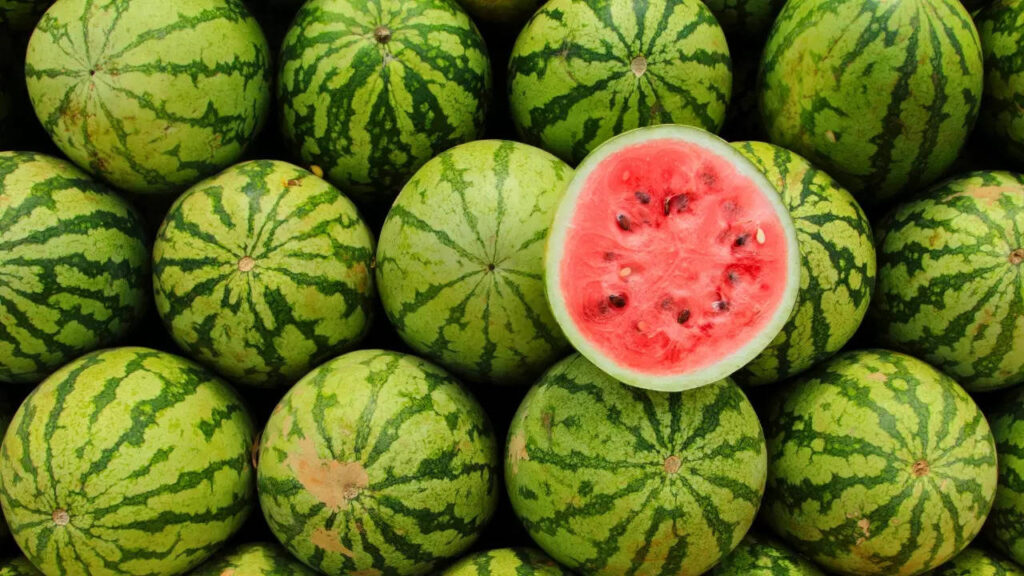Introduction
Watermelon is not only a delicious and refreshing summer fruit but also a powerhouse of nutrients that provide numerous health benefits. This article will delve into the various advantages of consuming watermelon, covering its nutritional profile, health benefits, and potential uses. By the end of this comprehensive guide, readers will understand why incorporating watermelon into their diet can be a smart and healthy choice.
Nutritional Profile of Watermelon
Macronutrients
Watermelon is low in calories but rich in essential nutrients. A typical serving size of one cup (152 grams) of diced watermelon contains:
- Calories: 46
- Protein: 1 gram
- Fat: 0.2 grams
- Carbohydrates: 11.5 grams
- Fiber: 0.6 grams
Vitamins and Minerals
Watermelon is a rich source of vitamins and minerals, including:
- Vitamin C: Boosts the immune system and promotes healthy skin.
- Vitamin A: Supports eye health and skin health.
- Potassium: Helps maintain proper electrolyte balance and muscle function.
- Magnesium: Important for muscle and nerve function, as well as bone health.
- Vitamins B1, B5, and B6: Play crucial roles in energy production and brain function.
Antioxidants
Watermelon is loaded with antioxidants that help protect the body from oxidative stress and inflammation. Key antioxidants found in watermelon include:
- Lycopene: A powerful antioxidant linked to reduced risk of chronic diseases.
- Beta-Carotene: A precursor to vitamin A, which is essential for eye health and immune function.
- Cucurbitacin E: Known for its anti-inflammatory and antioxidant properties.
Health Benefits of Watermelon
Hydration
Watermelon is composed of about 92% water, making it an excellent choice for staying hydrated, especially during hot weather. Proper hydration is essential for:
- Maintaining body temperature
- Supporting cardiovascular health
- Promoting kidney function
- Enhancing physical performance
Heart Health
The high levels of lycopene and other antioxidants in watermelon contribute to heart health by:
- Reducing blood pressure: Potassium and magnesium help regulate blood pressure levels.
- Improving cholesterol levels: Lycopene has been shown to lower LDL (bad) cholesterol and increase HDL (good) cholesterol.
- Preventing heart disease: Antioxidants reduce oxidative stress and inflammation, which are risk factors for heart disease.
Skin and Hair Health
Watermelon promotes healthy skin and hair due to its rich content of vitamins and antioxidants:
- Vitamin C: Essential for collagen production, which keeps the skin firm and youthful.
- Vitamin A: Promotes cell regeneration and repair.
- Hydration: Keeps the skin hydrated and supple.
Muscle Soreness
Consuming watermelon or its juice can help reduce muscle soreness after exercise. This is largely due to its content of:
- Citrulline: An amino acid that helps improve blood flow and reduce muscle fatigue.
Digestive Health
The fiber and water content in watermelon support a healthy digestive system by:
- Preventing constipation: Fiber adds bulk to stool, while water keeps it soft.
- Promoting regular bowel movements: A high-water content helps keep the digestive tract functioning smoothly.
Weight Management
Watermelon can be a helpful addition to a weight management plan due to its low calorie density and high water content. It provides a feeling of fullness with fewer calories, making it a great snack option.
Anti-Inflammatory and Antioxidant Properties
Watermelon’s antioxidants, such as lycopene and cucurbitacin E, play a significant role in reducing inflammation and oxidative stress, which are linked to various chronic diseases, including:
- Cancer: Lycopene has been studied for its potential to reduce the risk of certain types of cancer, including prostate cancer.
- Arthritis: Anti-inflammatory properties may help alleviate symptoms of arthritis.
- Diabetes: Antioxidants help manage blood sugar levels and improve insulin sensitivity.
Potential Uses of Watermelon
Culinary Uses
Watermelon is versatile and can be enjoyed in various culinary applications:
- Fresh Slices: A classic way to enjoy watermelon, either as a snack or dessert.
- Salads: Combine with feta cheese, mint, and arugula for a refreshing salad.
- Smoothies: Blend with other fruits and a bit of yogurt or milk for a nutritious smoothie.
- Juices: Make a hydrating and tasty juice or smoothie.
- Grilled: Grilling watermelon can enhance its sweetness and add a smoky flavor.
- Salsas: Add watermelon to salsa recipes for a sweet and spicy twist.
Skincare
Watermelon extract is used in various skincare products due to its hydrating and antioxidant properties. It is found in:
- Moisturizers: For hydration and anti-aging benefits.
- Masks: To soothe and refresh the skin.
- Serums: For brightening and evening skin tone.
Supplements
Watermelon supplements, particularly those containing citrulline, are available and often used to improve exercise performance and reduce muscle soreness.
Conclusion
Watermelon is not only a tasty and hydrating fruit but also a nutritional powerhouse that offers numerous health benefits. From promoting heart health and improving digestion to enhancing skin and hair health, watermelon is a versatile fruit that can support overall well-being. Its potential uses in culinary dishes, skincare, and supplements further highlight its value. By incorporating watermelon into your diet, you can enjoy its delicious taste while reaping its many health benefits.
Key Takeaways
- Hydration: Watermelon is an excellent source of hydration due to its high water content.
- Heart Health: Rich in lycopene and other antioxidants, watermelon supports cardiovascular health.
- Skin and Hair: Vitamins and hydration from watermelon promote healthy skin and hair.
- Muscle Recovery: Citrulline in watermelon helps reduce muscle soreness.
- Digestive Health: Fiber and water content aid in maintaining a healthy digestive system.
- Weight Management: Low in calories and high in water, watermelon helps with weight management.
- Anti-Inflammatory Properties: Antioxidants reduce inflammation and oxidative stress.
By understanding and leveraging these benefits, you can make watermelon a staple in your diet for a healthier lifestyle.
















